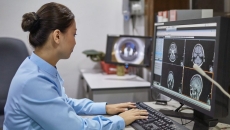biomarkers
The company will use the funds to increase the development of its computational platform to predict patient treatment responses and support drug research & development.
Researchers found variables associated with the pupillary light reflex were linked to significant differences between patients who’d had concussion and those who hadn’t.
Potential use in biomarkers includes detecting everything from Parkinson's disease to schizophrenia.
The Division of Digital Psychiatry is looking at using data to educate patients and predict adverse events.
Active monitoring can ask questions while a smartphone's sensors can go deeper into mood and anxiety levels, says Rashmi Patel, Fulbright Scholar at Beth Israel Deaconess Medical Center.
Poppy Crum, chief scientist at Dolby Laboratories, talks about a future where ubiquitous sensors anticipate physical and mental health needs.
The technology was co-created by researchers at MIT Media Lab and Massachusetts General Hospital Sports Science Lab.
In a small study published in JMIR, patients were more willing to share health data, such as activity and sleep trackers, than personal data, like call logs and location.



